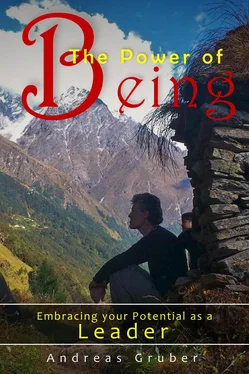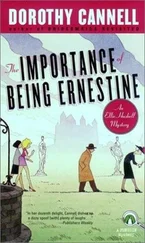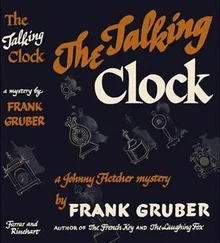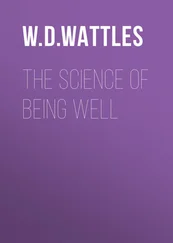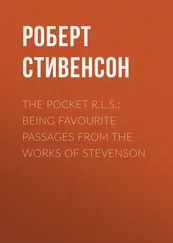There are many definitions of spirituality, many of them religiously influenced. A definition of spirituality that certainly would make a lot of sense in the corporate world could be – a wisdom that helps us to improve our individual and collective human experience, to make the most out of this life on the material plane and beyond.
You can find plenty of leaders out there possessing that kind of wisdom. At least many aspects are already there. The question is, are the business leaders of today aware of the necessity, and do they have the trust to make use of it - in a profitable way? Because if it can't be done in a profitable way, a leader will not survive very long.
This book isn’t about practicing something, it's about opening new perspectives, giving you options within your present frame of mind.
Every page implicitly points toward essentials, human qualities, and latent potential. It's an invitation to reflect, get inspired, discover, and to dig a little bit deeper.
Logical reasoning, planning, and willpower can only take us so far. We need to review outdated mindsets that do not serve us anymore. Ultimately this is a book about changing from within, after discovering for yourself, who you may be, what your heart burns for, what your values and motives are, what drives you from within. Applying this to yourself first will make you contribute to some serious change out there.
Old words of wisdom tell us that "the path is the goal." They suggest not to fix our attention purely on the outcome. We may perceive it as if we merely collect bits and pieces along the way, but once we arrive at our destination, we rest and reflect on what we have been through. In that moment of reflection, all our experiences will make sense and may turn into wisdom if we understood our lessons. However, it seems as if there simply is no time for that. This lack of time is not only external but very much an inner factor to be considered.
"We don't receive wisdom; we must discover it for ourselves after a journeythat no one can take for us or spare us."
Marcel Proust
We have become collectors of knowledge. But since the subtle details of what we learn are frequently missing, it may be of limited value for us. This book is very much about those missing subtle details.
You're likely to see a couple of things from a different angle. You may get a feel for what relevance or power, subtle perceptions, and mindsets could have. It is likely that you will be eager to try some of these hints, no matter how busy you are. They can mostly be done on the run - in real life. You will save time, energy, and nerves. Your subordinates will love it, without actually understanding what it is you are doing.
Have a good read!
This book has a 7-layer structure as the following chart illustrates.
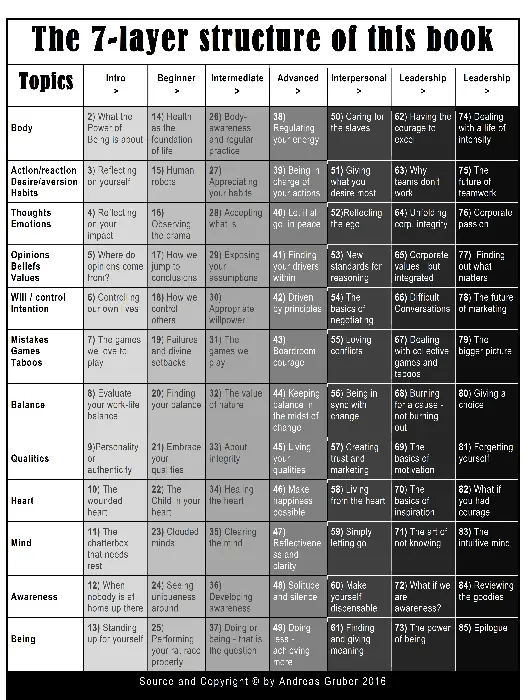
2 What the Power of Being is about
The Power of Beingis about being human in a genuine way, as a universal principle beyond ideology, philosophy, and religion. It is an experiential approach on how to get the best out of our professional lives and thus live more fulfilled lives.
It is based on the assumption that being and doing are of equal importance. It embraces qualities we already have as human beings, but that may be latent or used in other contexts.
It is based on the simple fact, that we can’t buy the hearts of our employees, any more than we can buy true love. It acknowledges the fact that ultimately we are not even able to buy their brains, nor can we buy or order their loyalty or commitment.
Change will take place, whether we want it, like it or not.However, it makes all the differencehow we deal with it, and respond to it.
It is by design about motivation and inspiration, since it puts human qualities in focus, and emphasizes meaning, purpose, direction, and fulfillment as elementary human needs. It acknowledges that more than fifty percent of our employees are unfulfilled or demotivated at work, not only as a fact but as a message that we need to understand. It is the wisdom of the crowds speaking to us.
The Power of Beingurges us to question whether our present strategies and behavior are still valid, for the organizations of the future. It encourages us to abandon what is obsolete about our lives.
It acknowledges the fact that most employees have the volition to contribute so much more than their bare hands, and what they are paid for. Most of them would not hesitate to contribute with their hearts and heads as well if we only knew how to access them. It encourages leaders to reflect on the present situation, to consider the odds of success, if things are done the way they are done now. It inspires not only to follow the intellect but also the heart.
The Power of Beingclaims that it is time to redefine leadership beyond intellectual knowledge, methods, and theoretical studies. It reminds us that in the midst of turbulent times, leaders not only need to embrace human qualities, but they also need to take the time to reflect, to be able and fit to lead. Good leaders also need to be able to look beyond themselves, in order to lead wisely.
Know thyself - said the inscription above the temple entrance of the oracle of Delphi. In different wordings, this has been the core message of innumerable sages and saints throughout the ages.
Most of us do not know how exactly to go about knowing ourselves, let alone to take a decent decision. Do we use logic, or is our decision intuitive, emotional or based on a certain gut feeling? Maybe it is everything combined. Who knows for sure? Nobody will and can hand it to you on a silver platter. You have to find out for yourself.
“ It is wisdom to know others; it is enlightenment to know one's Self”
Lao Tzu
There are different paths to gain self-knowledge. It all seems to boil down to two approaches. Firstly the outside and cognitive approach, which is more common in the west, and secondly the inside and introspective approach, as seen mainly in the east. But, it is not about east or west, it is about what is applicable in corporate life.
Imagine how it would be if we did not have mirrors and could not see a reflection of ourselves in any other way. How would you know what you look like? You would need others to describe yourself or maybe to draw or paint your image, in the hope they were accurate. Not being sure of their ability and judgment you might ask several people over a period.
“ Everything that irritates us about others can lead us to an understanding of ourselves.”
C. G. Jung
However, we have mirrors, and we do know what we look like externally. And what do we know about ourselves internally? What's the tool we use? Thinking? Up to an age of about 35 it never really occurred to me, that getting to know myself was an option or necessity. If I had a problem, I wanted to understand it. I remember how some inter-relational issues would almost drive me crazy. Talking to a friend about one of these matters that kept me busy, he replied, "But, not everything has to be logical." It would take at least another five years for that to sink in. Wanting to understand the world, but not having scratched the surface of understanding myself, since I was looking out there, preferring logical answers. Over the years, I learned that C. G. Jung's quote above was valid for me too, although I resisted it as long as possible. So, what irritates me about others, helps me to understand myself. That's one of the mirrors I can use to get to know myself on a deeper level.
Читать дальше
